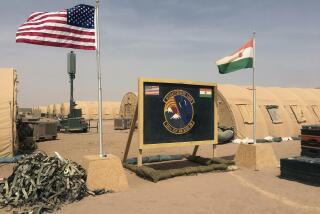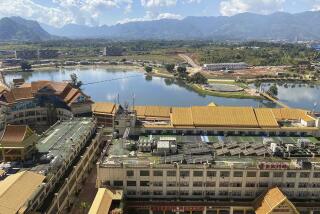Marines transfer control of river town to Iraqi forces
- Share via
HIT, IRAQ — In a pageant filled with poetry, song, political speeches and a display of the Iraqi security forces’ increased firepower, the U.S. Marines on Thursday turned over major responsibility for protecting this Euphrates River valley town to the Iraqi army and police.
It was the second such turnover in recent weeks in the western province of Anbar, once a major battleground with Sunni Arab insurgents, with more expected, Marine officials said.
Marines from the 1st Battalion, 7th Regiment, based in Twentynine Palms, Calif., are redeploying outside the city limits but will remain close enough to provide assistance to the Iraqis if insurgents attempt an assault.
A similar turnover was accomplished late last year in Baghdadi, also along the Euphrates. In addition, Marines are pulling out of Haditha as soon as the Navy construction team, the Seabees, finishes building a camp for them just outside the river town.
Iraqi forces conducted their first all-Iraqi operation this week in Haditha, searching former insurgent hide-outs, officials said.
And throughout Sunni-dominated Anbar province, the driving rules for Iraqis are changing. No longer will Marines block off streets and force Iraqi cars to pull aside when a convoy passes.
“This is a historic day,” Marine Lt. Col. J.J. Dill, the battalion’s commander, told several hundred Iraqi men who crowded into the town’s soccer stadium for the 90-minute ceremony and the open-air buffet that followed.
“Just over a year ago, this city was being killed by insurgents,” he said.
One question yet to be answered throughout the province is how the Shiite Muslim-dominated Iraqi army and the Sunni-dominated police will function without the U.S. providing immediate supervision. It’s a question, involving matters of competency and honesty, that concerns both U.S. and Iraqi officials.
“I ask the Iraqi police and Iraqi army to be honest,” Anbar Gov. Mamoun Sami Rasheed said in an emotional speech. “It’s the people’s rights; they own their own lives.”
Dill praised the city’s Sunni police chief for his emphasis on “civil rights and policing.”
Many of the Marines are being repositioned to prevent the movement of insurgents from the wide-open spaces of the westernmost part of the province, near the Jordanian and Syrian borders, toward the cities of the Euphrates River valley and even Baghdad.
An American flag was lowered at midfield, replaced by an Iraqi flag to cheers from the crowd. The exercise was symbolic. No American flag had flown over Hit or any Anbar city, under strict rules handed down by Marine brass.
As the American flag was lowered, an F/A-18 fighter jet made a screeching pass over the site, pulling into a nearly vertical ascent.
Cpl. Erin Sundstrom, 23, of Boulder, Colo., given the duty to lower the American flag, admitted being nervous as the focus of attention during what, for the Iraqis, seemed to be the emotional high point. “It was amazing,” he said.
Much of the ceremony was akin to that of any military transfer of authority, particularly as the troops, Iraqi and U.S., passed in review. Other parts were laden with Iraqi culture. In one skit, Iraqi soldiers simulated chasing and killing a rabbit and eating it raw -- a sign of manhood, interpreters told the Americans.
After the official ceremony, Iraqi soldiers broke into 30 minutes of spontaneous dancing and chanting. “Let the terrorists come. We’re ready,” they chanted in Arabic.
Dill said he became convinced the Iraqis were ready for the security responsibility by how they reacted Dec. 12 when insurgents struck a bridge. “There was no panic,” he said.
--
More to Read
Sign up for Essential California
The most important California stories and recommendations in your inbox every morning.
You may occasionally receive promotional content from the Los Angeles Times.













